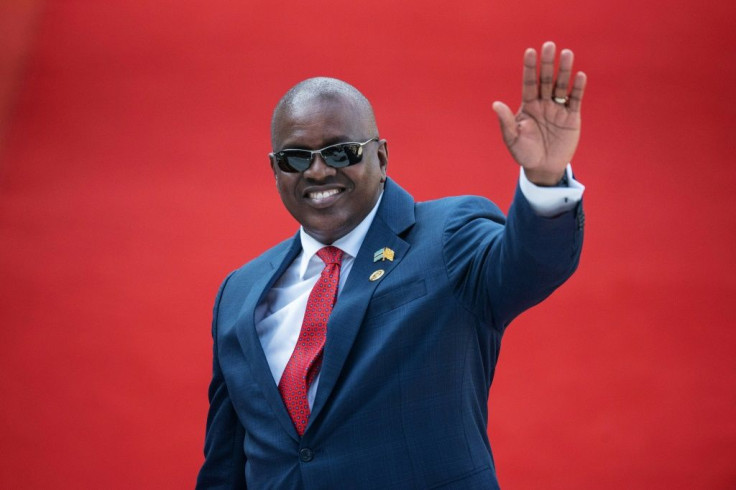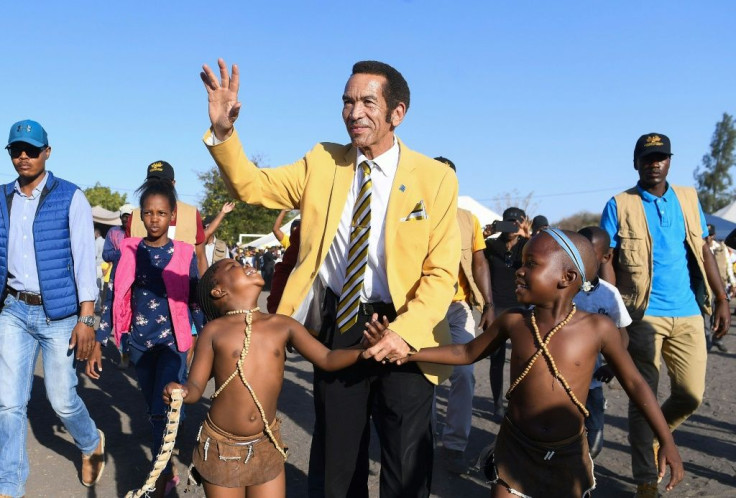Botswana's President Masisi Wins Hotly-contested Election

Incumbent president Mokgweetsi Masisi on Friday won a five-year term in Botswana's elections which saw his ruling party secure more than 51 percent of parliamentary votes, the chief justice said.
"Dr. Mokgweetsi Eric Keabetswe Masisi is elected President of the Republic of Botswana," chief justice Terrence Rannowane announced.
The main opposition protested the outcome, saying the ballot had been "massively rigged."
The Botswana Democratic Party (BDP), which has ruled since independence from Britain in 1966, was declared the winner after attaining the minimum 29 parliamentary seats required to form a government following Wednesday's vote.
Masisi thanked voters, saying he was "humbled" that they had entrusted the BDP.
"As the President of Botswana for the next 5 years, I'm blessed and privileged to serve you and promise that I'll continue to do so with integrity, compassion, humility and honesty," he said in a tweet.
An unofficial tally showed the ruling BDP won 38 seats in the 12th parliament -- a slight improvement from the 37 attained in the 2014 election.
The largest opposition, the Umbrella for Democratic Change (UDC), lost two seats compared to the previous election, securing only 15 seats this time.
The Botswana Patriotic Front (BPF), endorsed by the former President Ian Khama, got three seats and one smaller party bagged just one seat in the national assembly.

Around 931,000 of the country's 2.2 million people registered to vote in the parliamentary and local elections.
Masisi, 58, became president in April 2018 as the hand-picked successor to Khama, who resigned at the end of his constitutional limit of two five-year terms.
Feud
Diamond-rich Botswana is seen across Africa as a beacon of continuity and democracy.
But Khama shook up the country's traditionally calm politics by dramatically renouncing his hand-picked successor, Masisi, accusing him of autocracy.

The rift between the president and his predecessor started last year, immediately after Khama handed over the reigns.
Once in power Masisi quickly started reversing several of Khama's key policies, including lifting the ban on elephant trophy hunting, infuriating his predecessor, avid conservationist.
During the election, Khama threw his weight behind the UDC, once his fiercest critic.
In May, he stormed out of the governing BDP, and endorsed a newly-created BPF, which fielded candidates in only 19 of the 57 constituencies.
Khama, whose father co-founded the BDP and served as Botswana's first president, retains plenty of influence, particularly in the central region -- a BDP stronghold -- where he is a traditional chief.
The feud threatened to fracture the BDP and sap voter support.
Already the ruling party had seen its share of the vote decline in past elections. It fell below 50 percent for the first time in the last elections in 2014.
'Massively rigged'
The three-party UDC, which has posed the greatest challenge so far to BDP dominance, claimed the election was "massively rigged" and riddled with irregularities around voter registration which "undermine the credibility" of these elections.
"Throughout, the IEC has shown grave incompetence and could not have delivered a free and fair election," UDC leader Duma Boko told AFP
The election outcome "does not deserve any respect," Boko charged.
Boko also fingered the ruling party for a "deliberate and well-orchestrated plan to steal this election", after it realised that it was on "very shaky ground".
The UDC won 17 out of the 57 seats in the last election five years ago.
On Friday an observer mission from the regional bloc, the Southern African Development Community (SADC), declared the pre-election and voting phases had been well organised and conducted in a "peaceful and free atmosphere".
Despite numerous opposition party disputes, SADC observers have endorsed elections in Malawi, Zimbabwe and Mozambique in recent years, declaring them all to be free and fair.
© Copyright AFP 2024. All rights reserved.





















